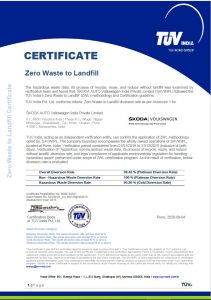ŠKODA AUTO Volkswagen India Private Limited (ŠAVWIPL) achieves yet another sustainability milestone with ‘Zero Waste to Landfill’ certification by TUV Nord, a global inspection, certification and testing leader.
The company that represents the passenger vehicle brands of Volkswagen Group in India including ŠKODA, Volkswagen, Audi, Porsche and Lamborghini, accomplished the feat a year early ahead of its initial target by achieving a 98.42% diversion rate and a wastage of less than 1.10 kg per vehicle. Furthermore, SAVWIPL aims at being a carbon neutral firm by 2025 under the Volkswagen Group’s ‘GoToZero’ initiative.

Commenting on the occasion, Gurpratap Boparai, Managing Director, SAVWIPL said, “Zero Waste to Landfill is just a beginning and compliments our ambition of a sustainable manufacturing footprint with net zero environmental impact. We are working to minimize environmental impacts along the entire lifecycle for all our products and mobility solutions – from raw material usage to finished products – in order to keep ecological balance and to create positive impacts in our daily life, while offering customers advanced mobility solutions through our 5 passenger vehicle brands.”
Zero waste to Landfill means zero manufacturing waste is disposed directly to landfill or to Incineration without energy recovery by the site, except where local legal requirements specify that regulated wastes must be disposed in a landfill. The hazardous waste data, its process of recycle, reuse, and reduce without landfill process at the company’s manufacturing operation at Aurangabad and Pune achieved overall 98.42% diversion rate (platinum category) as per TUV India’s Zero Waste to Landfill’ (ZWL) methodology and certification guideline. TUV Nord is one of the world’s largest inspection, certification and testing organisations for industrial self-control, providing independent, neutral, third party certification.
Key sustainable manufacturing practises adopted by SAVWIPL include:
Water Conservation
Considering water to be one of the most natural resource, SAVWIPL has put a lot of efforts in order to avoid the wastage of water in any form. With these efforts, group’s Pune & Aurangabad facilities are now Zero Liquid Discharge sites where water conservation projects to reduce evaporative losses are being implemented. Along with that, SAVWIPL is working with International Association for Human Values (IAHV) for a Water Shed Management Project in Latur, Nippad, Gulani villages conserving 220,000 m3 of water.
Green Energy
In 2018, the company inaugurated its first major Solar PV installation with a capacity of 980 KW, at its manufacturing facility in Aurangabad followed by an 8.5 MWh plant at its Pune Facility in December 2019. The combined technical capacity of installations at Aurangabad and Pune stands at 9.4 MWp, saving close to 10,000 tons of CO2 emissions annually. The company aims to increase the capacity of solar power plant to 30% of total energy consumed by 2021 and work towards net zero carbon production by 2025 by re review our energy mix and the option to derive non electrical energy through Bio Gas, waste heat recovery and further reduction in Specific Energy Consumption to achieve Carbon Neutrality in our production network by 2025.
Tree Plantation
ŠKODA AUTO Volkswagen India Pvt Ltd, at its Pune plant, planted around 23,000 trees. Further, the group had signed a Memorandum of Understanding (MoU) with the Mangrove and Marine Biodiversity Conservation Foundation (MMBCF), to plant over 450,000 mangrove facilities towards restoration of degraded mangrove forests in Alibaug, coastal town of Raigad, Maharashtra.
The group also opened Aurangabad’s first Oxygen Park in Shendre in December 2019. The strategically located park has over 15,000 densely planted facilities and trees, with potential to sink high levels of CO2 emission emerging from the industrial belt in the region.
Disclaimer: This media release is auto-generated. The CSR Journal is not responsible for the content

